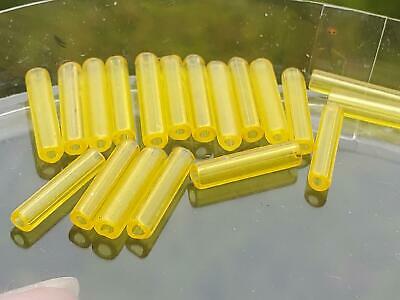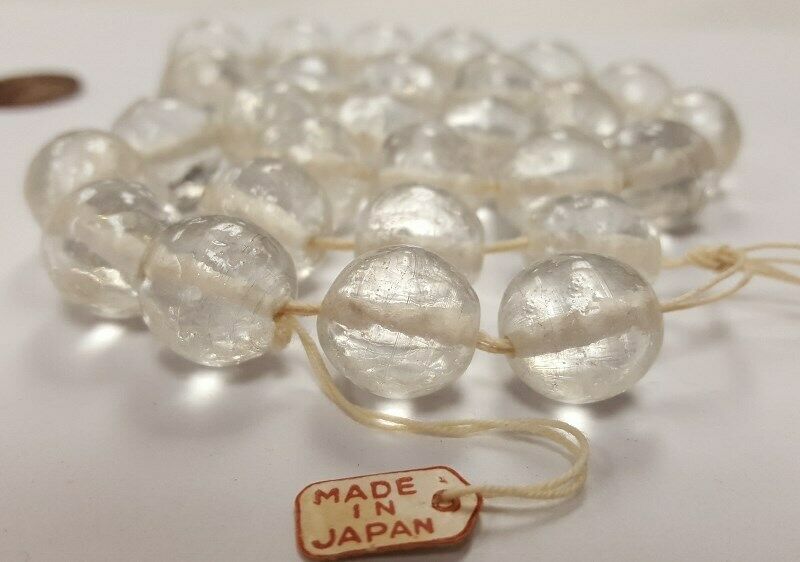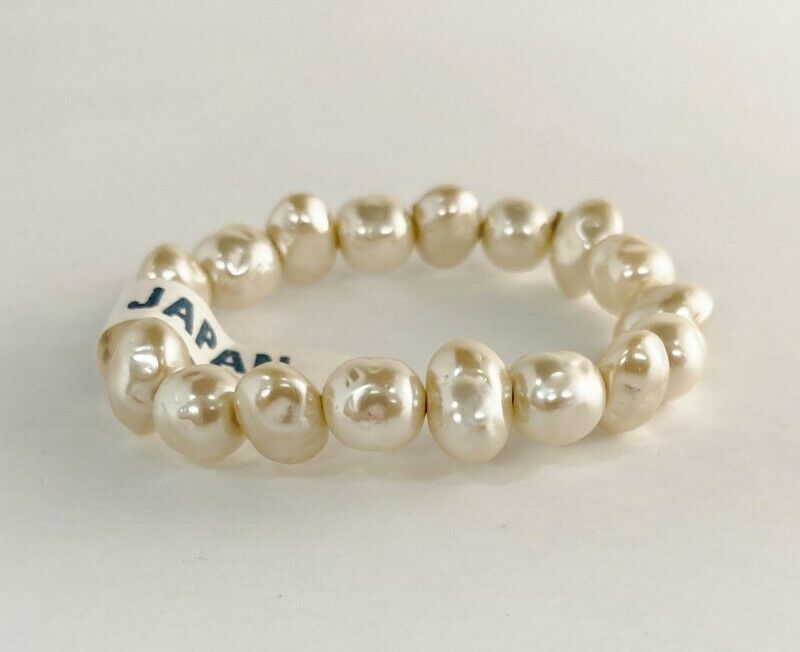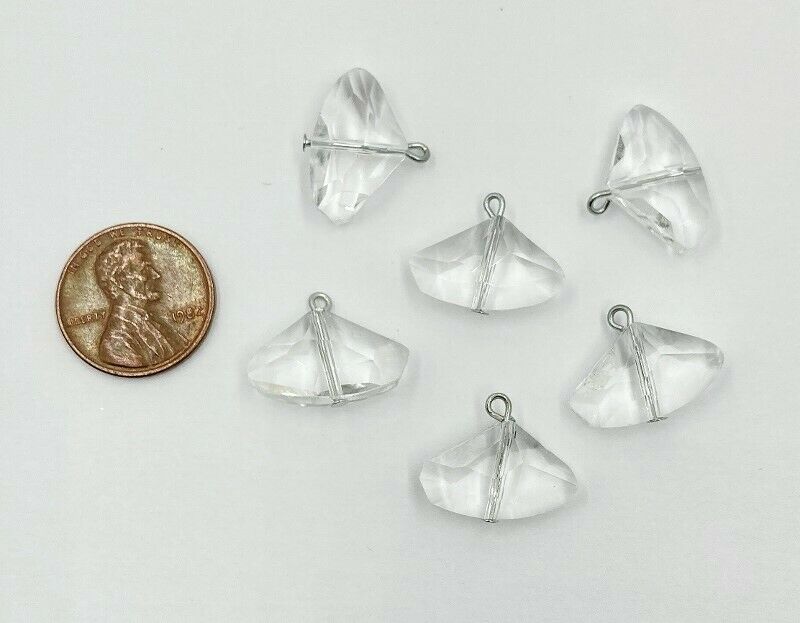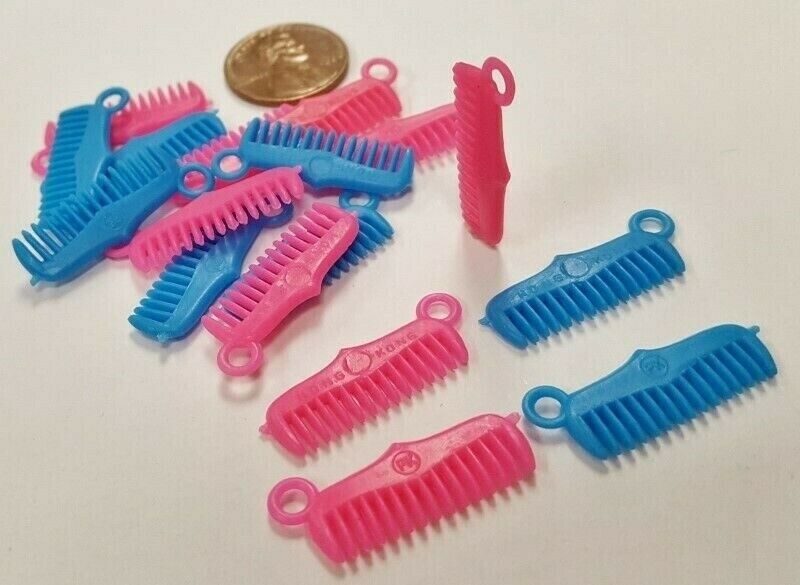-40%
Vintage Manganese Glass Beads ~ Translucent Yellow Bugle Beads Bohemian Jewelry
$ 2.24
- Description
- Size Guide
Description
Vintage German Old Stock Yellow Bugle Manganese Glass Beads Glow Pink under Black Light Number of Beads per Lot: 20 Colors: yellow (manganese glass) pink/orange under black light. Shape: Bugle Size: 12mm Vintage German Old Stock I met a gentleman years ago that traveled throughout Europe buying out old glass jewelry factories and remnants of family-ran businesses and he would purchase EVERYTHING from them. He would crawl through dirty basements and climb into dusty attics to find all of these wonderful treasures. He started importing his old and new finds into the US in the 80's. He retired about 20 years ago and since then all of this jewelry has been stored in his warehouse. I purchased his remaining inventory of vintage beads and I add new things weekly. Check back to see what I found.Vintage German Old Stock
Yellow Bugle Manganese Glass Beads
Glow Pink under Black Light
Number of Beads per Lot: 20
Colors: yellow (manganese glass) pink/orange under black light.
Shape: Bugle
Size: 12mm
Vintage German Old Stock
I met a gentleman years ago that traveled throughout Europe buying out old glass jewelry factories and remnants of family-ran businesses and he would purchase EVERYTHING from them. He would crawl through dirty basements and climb into dusty attics to find all of these wonderful treasures. He started importing his old and new finds into the US in the 80's. He retired about 20 years ago and since then all of this jewelry has been stored in his warehouse. I purchased his remaining inventory of vintage beads and I add new things weekly. Check back to see what I found.
The following are some articles I found discussing Vintage Glass Beads that you might find interesting:
A site called wildthingbeads stated:
At the end of the war, 1946, the Germans were expelled from Czechoslovakia. They were given 48 hours to leave, usually with just one suitcase of belongings. They had to leave behind everything else they owned; their houses, their furniture, their businesses. The Czech workers who were employed by them were able to take over the factories, and keep them running. Whole Czech families moved into German houses, filled with furniture and chinaware, silverware and linens. The German refugees streamed into war torn Germany, and most of the bead makers ultimately settled in Bavaria, near the town of Kaufburen.
Efforts were made to keep all the bead makers together, so the bead industry would survive, and a bombed out ammunitions factory outside of Kaufburen was purchased for this purpose. The town was named Neu Gablonz. Kaufburen/Neu Gablonz is about an hours drive south of Munich on the way to Austria. By 1947, over 2000 bead makers had settled in Neu Gablonz, and started producing beads. Resources were so scarce, clay and bubblegum were used as molds to create bead shapes. Some of the bead makers did bring their molds with them, and of course some of the refugees were mold makers.
*************************************************************************************
an ebay buying guide stated this:
Czech Glass Beads
Many terms are used to describe glass produced in what is now the Czech Republic: Bohemian glass, Czech glass, or Bohemian or Czech crystal. Hand-cut glass has been a tradition in Bohemia since the thirteenth century. Another distinction is that, while Swarovski crystal often contains lead, Bohemian (or Czech) glass uses oxides other than lead. For this reasons, some may prefer Czech glass beads over Swarovski crystal. Buyers should keep in mind that Czechoslovakia existed between 1918 and 1993; anything labelled as being produced in the Czech Republic is not vintage, as it would date after 1993.
West German Glass Beads
West Germany was yet another major producer of glass beads in the vintage period, and many quality vintage glass beads are of this provenance.
How to Identify Vintage Glass Beads
As for individual beads, there are several ways to physically inspect it for signs that it is genuinely vintage. Novice collectors should have patience with themselves as they develop their knack for identifying genuine glass vintage beads.
Looking at the Bead
Examine the bead closely in daylight or in a strong light, using a magnifying glass if possible. There are a few signs that the bead is glass and vintage.
Seams and Imperfections
Seams are an indication that the bead is vintage. Some beads were crafted using a glass press, which inevitably left a seam. In other cases, there may be slight imperfections as a result of being handmade, as they often were in Venice and Czechoslovakia. As buyers become more experienced, they hone their ability to identify irregularities that point to a bead's authenticity.
Signs of Aging Glass
Glass tends to change as it ages. Luster may diminish, and the colour in vintage glass beads alters slightly as the chemicals that give the glass its particular hue react with air. For example, a translucent red bead may darken a bit. This is a very subtle difference that an expert may notice, but the untrained eye could quite easily miss.
Checking How the Bead Feels and Sounds
When held in the palm, a glass bead is likely to feel cold and heavy. Lighter beads are most likely plastic imitations. If holding a few beads, gently shake them around so that they knock together. If the sound is loud, they are glass. A soft clinking is probably a sign that they are plastic.
With their unique appearance, quality craftsmanship, and individual history, vintage glass beads can indeed seem like small treasures.
*************************************************************************************
A site called beadinpath stated this:
Why are vintage colors special?
In the early days, glass crafters experimented with colors, using a variety of materials that are hazardous and poisonous, such as gold, arsenic, oxides and precious metals. Cutting costs and looking for ways to increase safety caused these crafters to adopt other techniques for making glass. During WWII, many factories went up in smoke, and took with them recipes for creating colors. In an attempt to regain them, much expirimentation took place and resulted in happy accidents. For example, the recipe for âopalâ finish was lost in the war. In an attempt to get it back, the âgreasyâ glass colors were created. These beads were produced for a short time, and eventually when the âopalâ technique was rediscovered, greasy glass beads were pulled from the production line. So greasy glass is collectible with a history and a story.
When looking for vintage the pastel example color is a great place to start bead identification. If you hold
up a pastel pink bead made today against a bead made in, say 1945 Germany, and they are pretty much alike, you will notice that the bead made today is not really PINK. Its more peach. Why is that? Because the bead made in 1945 is made from a glass recipe that contained things different ingredients, like real gold. In fact, pink, purple and red contain the most gold of any other color. The pastel color rule applies to all colors. True colors, in soft shades can be found in vintage stock, while today stock misses the mark nearly every time.
Images sell!
Get Supersized Images & Free Image Hosting
Attention Sellers - Get Templates
Image Hosting, Scheduling at Auctiva.com.
Track Page Views With
Auctiva's FREE Counter
